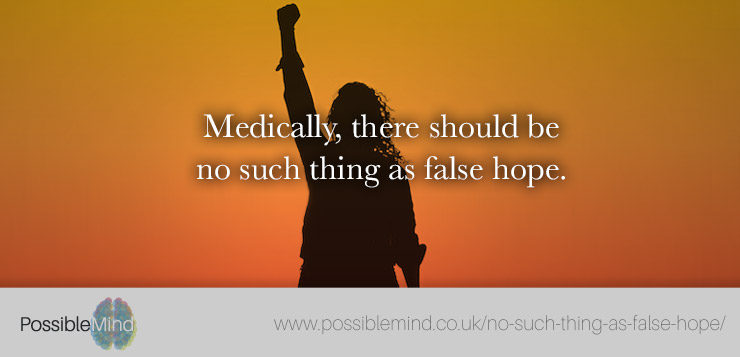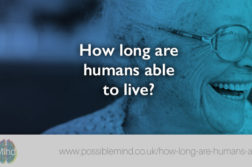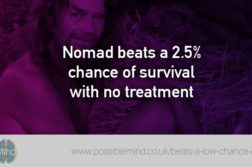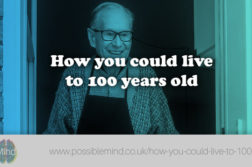False hope refers to hope that is based on ‘unrealistic‘ or ‘incorrect expectations‘.
It can arise when a person believes in something that is unlikely to happen or when they are given false information or promises.
For example, in medical contexts, false hope is said to be harmful when a person is given false information about their health condition or prognosis.
We can all agree that the description above explains the concept of false hope. However, the words highlighted in bold above are the keys to why I feel false hope is a phrase that should be removed from the medical lexicon.
Is it right for a medical professional to decide what is unrealistic, unlikely or even to manage the expectations of a patient? Of course not. The reason for this is that there are just too many variables involved in a person’s recovery for anybody to remove hope. As Dr Jeff Rediger puts it in his fantastic book, Cured, a prognosis is a doctor’s ‘Best Guess’.
Yes, you heard that correctly. Hope is removed, one of the very things that makes life worth living, on a best guess. How unfair and unkind is that?
Would it have been correct to remove hope from the people in concentration camps regardless of their survival probability? Of course not, but it currently seems ok to do it to people with serious illnesses.
“Viktor Frankl was a sober realist: he details the horrors of Auschwitz and the moral corruption of those who worked there. His philosophy was not about wishing away problems or pretending they do not exist, but rather to acknowledge them in their grim reality. Yet in spite of this realism, or rather because of it, he describes how holding onto hope was literally a life-or-death choice. Those who lost hope, he said, developed a certain look in their eye, a fatalism that inevitably ended in death. They experienced an “existential vacuum” — his term for a complete loss of meaning, a loss of hope, a sense that nothing really mattered any more.”
Source – muldoont.medium.com
With this powerful statement above, why would anyone choose to remove hope from someone with a serious illness? Especially when you take that in the context that pretty much every illness at every stage of its process has been overcome and recovered from at least once. Even those few illnesses that have yet to have someone recover from it will someday have the first person to do so. Think of the first people to recover from HIV/AIDS or stage 4 cancers, it happened. it is possible and therefore was always possible.
The most famous example of the medical profession’s best guess being off is when they stated that it is humanly and physically impossible to run a mile in under four minutes.
In May 1954, this changed when Roger Bannister did the ‘impossible’ by running a mile at 3:59.40.
Once Bannister’s achievement lifted the medical profession’s limiting voodoo hex (more on this later) from humankind, other people began to ran it in quicker and quicker times, today the world record for one mile stands at an incredible 3:43.13.
The counterargument made could be that most humans still cannot run a mile in under 4 minutes, it is only the select few with this ability. To me, this misses the point I am trying to make. When focusing on the probable instead of the possible hope is removed, and I feel this is wrong.
To me there is always hope regardless of how probable, as these few quotes help demonstrate:
You can believe the diagnosis, not the prognosis.
Deepak Chopra“Hope is important because it can make the present moment less difficult to bear. If we believe that tomorrow will be better, we can bear a hardship today”
Thich Nhat Hanh“Because you are alive, everything is possible.”
Thich Nhat Hanh
3 Examples
Let’s have a quick look at three examples that demonstrate the power of hope and possibility in the recovery of patients:
1.
The first is about Tom as mentioned by Dr Vernon Coleman in his book Mind Over Body.
For several weeks Tom had been having uncomfortable sensations in his chest resulting in a persistent cough and difficulty catching his breath. His doctor was concerned and prescribed him the usual drugs for this condition, however, none of them helped reduce the symptoms. Tom could still work, with a little help, but felt annoyed and tired.
After some time the GP referred him to the relevant specialist who admitted Tom to hospital for a variety of different tests and procedures. After a few days, he was discharged and went back to his day to day life with the symptoms unchanged, whilst awaiting the results.
After several days Tom was diagnosed with a fast-growing Cancer which the Consultant predicted would result in Tom having around a month or two to live.
Within a couple of days, Tom took a turn for the worse. He was now bed-bound and work became impossible for him. He lost weight and needed constant nursing. The consultant’s prediction looked about right and Tom would indeed pass in the suggested timescale.
A second phone call from the hospital was about to change everything for Tom and his family. The very apologetic voice explained how the hospital had made a mistake. There had been a mix-up. Tom did not have cancer, he had an infection which could be treated with special drugs. Within a day Tom was up and about living his life, back at work, eating and walking. Interestingly he still had the chest symptoms but was now not dying.
2.
Interestingly, the patient’s family are the first to be told about the diagnosis and prognosis in China. They then decide if the actual patient should be told or not.
The example in Dr Rediger’s book Cured shares how the family of Nai-Nai chose not to let her know that she had stage 4 lung cancer and was given just 3 months to live. They felt that this information would destroy her spirit and she would surely die sooner.
On this occasion, it seems this family made the correct choice because Nai-Nai, unaware of both her diagnosis and prognosis, was alive three years on with her cancer in stasis, neither growing nor shrinking.
3.
Aged 40 and diagnosed with abdominal mesothelioma Stephen Jay Gould was given eight months to live. Gould then discovered that his prognosis was based on ‘median statistics’. Digging a little deeper into the illness and survival rates, he discovered that there are actually many more possibilities than the predicted death he was told by the medical staff.
Knowing himself better than the doctors, Stephen concluded from his research that he actually had a higher chance of survival and that it is pretty common for people of his age and lifestyle to live a longer and more fulfilling life with abdominal mesothelioma. This totally changed his perspective of his situation and, based on the two previous examples, it may have saved his life too.
This experience led Stephen to write ‘The Median Isn’t the Message‘ in which he explains in much more detail his journey from diagnosis to better understanding the dangers of doctor’s giving a prognosis.
Alternatives
I hope that, like me, you can now see that removing hope is not just unkind but also that we can never know enough to inflict the removal of a possible future from anybody.
So what are the alternatives to our current model?
- Do we, like the Chinese, not tell the patient and let the family decide?
- Do we do our own deep-dive research into our illness?
- Do we educate ourselves about a prognosis being a best guess?
Well, I think it is fair to say the China Method is out because western cultures would not enable this as we are much more focused on individual choice.
The other two options are both possible, but for starters, I would like the medical profession to be more honest about the range of possible outcomes, thus still allowing for life-affirming hope.
When giving a prognosis, I would like medical professionals to remember this quote from Dr Vernon Coleman:
We think it is bizarre that there are people living in Africa or the West Indies who can be so terrified by a threat from a witch-doctor that they will go home and quietly die. Yet the only difference is that our witch-doctors wear white coats and stethoscopes instead of grass skirts and hideous masks. The Plain truth is that there is nothing in the world which has such a far-reaching effect on your health as your mind. The way you respond to stress, pressure and worry will determine the condition of your heart, circulatory system, stomach, respiratory system and every other organ and tissue in your body. It is your state of mind which determines what diseases you will develop and how long you will live.
Within NLP and hypnotherapy circles, it is well-known that whilst in a state of shock people are much more susceptible to suggestion. Meaning that being told you have a serious illness could leave you feeling shocked, and to then be told you have six months to live could be all that is needed to set the hex and curse.
I would like to suggest this as the language that I would like to hear should I ever receive a serious illness diagnosis is:
You have [insert serious illness diagnosis here]. We no longer give a prognosis which tells patients how long we think they have to live because those statements were always a best guess.
A guess that would be made without enough information. A guess which wouldn’t be fully informed.
The fact is that this illness is humanly survivable because it has happened in the past. Regardless of the probability, this is where I like to ask my patients to put their attention.
Even though some succumb to this illness, others, more importantly, have survived or have made a full recovery.
Let us both hope that this is what happens for you.
The statement above is both honest and more importantly doesn’t remove hope. It is also a living statement that is open to be refined and perfected, so the medical profession can be honest and still leave hope intact. Please do comment below because I would love to hear your thoughts about this post along with your suggestions as to what should be said by medical professionals when giving a diagnosis and prognosis of a serious illness.
If you like this post you will also enjoy:
- Mind Power and Belief for Recovery and Healing
- How Wu Wei Can Help Us Heal.
- The Paradox of Intention.
- The Grace Of Not Knowing.
- Like War, Illness and Pain are Not Bad.
- The Healing Power of Illness Book Overview.
- Want to live to 100? Copy the Japanese.
Further Reading:






